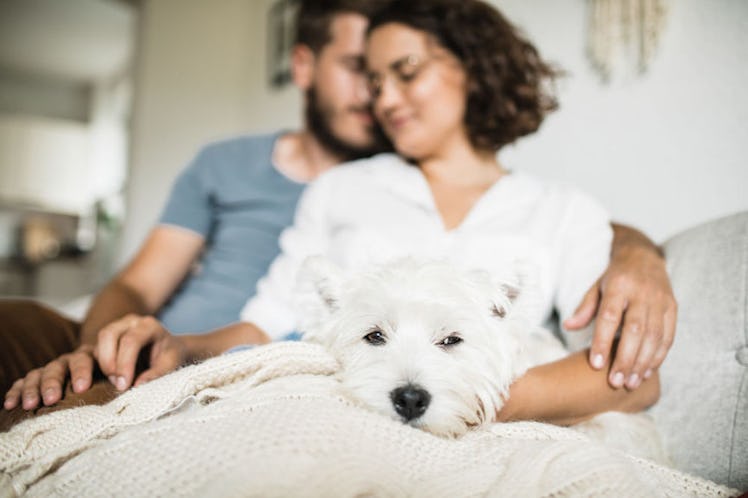
A Vet Reveals How To Help Your Pet Cozy Up To Your Partner If They're Not Getting Along
Whether you have a sweet little pup or a cuddly cat, there's one thing you can be sure of: You are number one in their life. As a pet parent, you're the one they can snuggle up against when they're feeling anxious, and the one who holds all of the tasty treats. So when your significant other comes into the picture, it's totally understandable for your fur baby to be a little wary of the potential threat to your bond. If you're wondering what to do if your pet hates your partner, look no further, because a vet has some suggestions for how to make things a little more peaceful.
According to Dr. Andrea Sanchez, DVM, of Banfield Pet Hospital, it's definitely not unusual for your pup or kitty to be protective of you when your SO is around. "Remember that you are your pet’s primary source of food, protection, and bonding, and they can sometimes feel that new people might threaten that reliability," she explains in an email to Elite Daily. If your pet is feeling suspicious, try to keep their interactions with your partner short (unless you're already living together, of course). Ideally, though, says Dr. Sanchez, gradually increasing the amount of time your favorite animal and favorite person spend together over a period of weeks is the best way to help your pet come to an understanding that your partner is here to stay.
Setting the tone for the environment where your pup and your partner interact is also key to helping them get along, Dr. Sanchez adds. "While it depends on the individual pet, it’s typically best to introduce your dog or cat to a new partner in a comfortable setting, like the home," she tells Elite Daily. Try to create a "safe zone" where your pet can retreat to when she feels anxious around your SO, suggests Dr. Sanchez. This could be a corner of your bedroom that's set up with a comfy bed, a favorite toy, and a water dish. "For dogs in particular," says Sanchez, "a kennel can be the ideal ‘safe space’ — not a place to send them when they are bad, but one they can go to get away from any stresses." This way, if your fur baby is unhappy that you're having your partner over, she has an already-comforting place to calm down.
Think about it this way: If you have younger siblings, then you probably remember how special it was to you whenever you got any one-on-one time with your parents. In a similar way, spending quality time with your pet helps to reassure her that she isn't being replaced by your SO, says Dr. Sanchez. "It’s imperative to carve out time to give them special attention, whether through walks, cuddles, or play sessions," she explains. And don't forget to have fun together as a group of three from time to time. "Include your partner in these activities to help your pet associate them with positive things," suggests Dr. Sanchez.
Make sure to give the relationship between your pet and your partner time to develop, rather than rush an instant connection, she adds. "Just like humans, pets can have an adjustment period when being introduced to someone new," the veterinarian explains. Since animals have such a strong sense of smell, she recommends trying to acclimate your pooch to your partner's smell by putting an old item of their clothing near her bed or her favorite spot on the couch.
Of course, if you have fears or apprehensions related to how your pet may react to or behave around your significant other, it never hurts to talk with your veterinarian about other behavioral tips and tricks. If things seem particularly tense, you could also consider working with a professional trainer or a veterinary behaviorist, says Dr. Sanchez, who can help you work through problems and develop a specific plan for how to deal with these types of situations.
Cats, specifically, may be less likely to instantly take to a new face around your home than a dog would, according to Dr. Sanchez. "In general, cats are accustomed to playing the solitary hunter, stalking prey and staying hidden without the aid of a pack or pride to watch their back," she tells Elite Daily, "making the feline the more self-sufficient of house pets." This means that the adjustment period might last a little longer before your favorite feline and your SO become BFFs, but at the end of the day, says Dr. Sanchez, most cats will eventually adjust to your new partner over time.
Whenever your pet isn't acting like the angel you know her to be, just remember that loyalty and devotion are some of the most wonderful characteristics of a sweet cat or dog, and your fur baby might not really be showing hate for your SO, but love for you — her favorite person in the world.